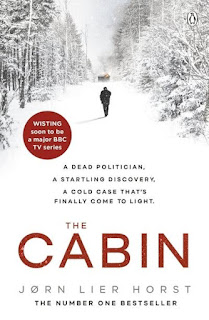The Cabin is the second of Jorn Lier Horst’s Cold Case Quartet, and I read it soon after reading and reviewing the third (and most recent in English) of the four, The Inner Darkness. In many ways, I preferred The Cabin, although it’s a less “flashy” thriller than the one that followed, which had an escaped serial killer and his unknown accomplice at its core. But The Cabin begins with a great hook: Bernard Clausen, a senior Labour Party politician is found dead in his cabin by the sea, and along with his corpse is a well-wrapped haul of dollars, pounds and euros, to the tune of some 80 million Norwegian kronor.
The body was found by the party head, and soon the Director General of the police has brought Wisting in to head his own investigation—not of of the death, which appears to be natural causes—but of the money: where it came from, why Clausen had it, and what he may have done to get it, or planned to do with it.
From this unlikely start, the story grows; the disappearance of a young man in the same locality some 15 years earlier might be related, and soon Wisting has uncovered a possible link to another crime. Behind all this is the political intrigue: it may be a mark of Norwegian politics that Wisting is given the leeway he needs for his investigation, but there are sensitive areas for both the party and the government, and Wisting’s small team soon expands to include Adrian Stiller, of Kripos, the national criminal service, roughly the equivalent of the Special Branch. Stiller is a recurring character, one who’s got his own agenda—Wisting tends to see it as personal, rather than political, but often they can be the same thing.
Also on his team, inevitably, is his journalist daughter Line, in this case for her research ability, and from her point of view the mystery might be the jumping off point for the sale of a big story or crime podcast. Line is an interesting character, but she tends to be filled in with rather less detail than we might like because she is more a vital part of the plotting: namely to be the damsel in distress. She is Jamie Lee Curtis babysitting and having to open the cellar door; she is the heroine tied to the tracks waiting – capable of fighting back but inevitably needing rescue. Which creates a real idiosyncrasy in this series: Line is often calling her father, usually in relation to his granddaughter; they live close by. But when Wisting thinks he sees someone leaving her house, and she feels like someone indeed has been there, there’s no follow-up. And as is the case in both the novels I’ve just finished, when Line calls in a real emergency, Wisting is always too busy to take the call. Which keeps the suspense moving, but you would think that he wouldn’t ignore his own phone only when the call is crucial. At least the odds are against it. He also reacts the way many characters in Nordic crime tend to, by ignoring the quickest way of sending help in favour of his own progress. This appears to be a pan-Scandinavian, pan-media quirk which I cannot explain.
Otherwise, The Cabin is an excellent procedural in which following procedures is the only way to deal with a case both cold and extremely hot. It proceeds without gimmick, and there is a twist which is perhaps more obvious to us than to Line, but still is a surprise. As I said, it’s got an element of originality and a limited group of investigators, which makes everyone stand out, and now I will continue my backwards progress in Horst’s quartet, with the first volume, The Katharina Code.
The Cabin by Jorn Tier Horst Penguin/Michael Joseph £13.99 ISBN 9780241405963

No comments:
Post a Comment